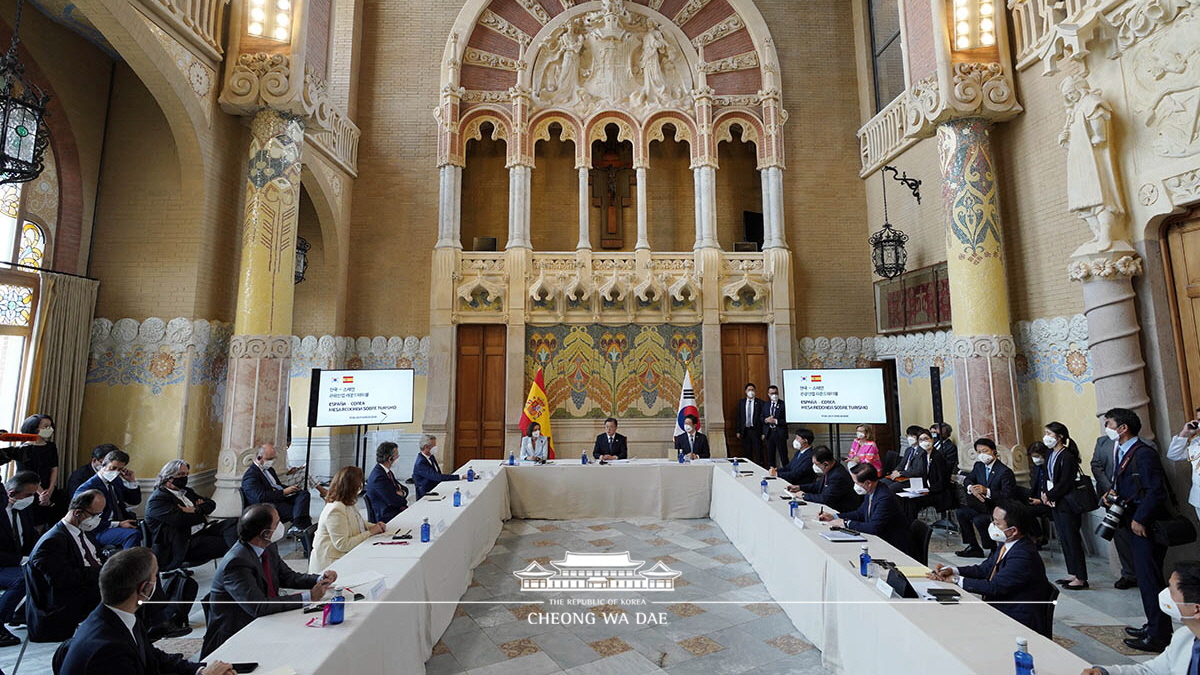이 웹사이트는 제19대 대통령 임기 종료에 따라 대통령기록관이 「대통령기록물 관리에 관한 법률」에 의해 이관받아 서비스하는 대통령기록물입니다. 자료의 열람만 가능하며 수정 · 추가 · 삭제는 불가능합니다.
다만, 「개인정보보호법」에 의하여 개인의 정보를 보호받기 원하시는 분은 관련 내용(요청자, 요청내용, 연락처, 글위치)을 대통령 웹기록물 담당자(044-211-2253)에게 요청해 주시면 신속히 검토하여 조치해 드리겠습니다. 감사합니다.
SPEECHES & REMARKS
BRIEFINGS

I am glad to meet you all.
Tourism industry professionals and business leaders representing Korea and Spain,
I am especially glad to meet all of you in Spain. I am deeply grateful to Spain’s Minister of Industry, Commerce and Tourism Reyes Maroto, Korea’s Minister of Culture, Sports and Tourism Hwang Hee and other relevant officials for their hard work in arranging this Korea-Spain Roundtable on Tourism.
Embedded in humanity is a gene for travel. Humanity has continued to evolve – awestruck by new places and unafraid of meeting and experiencing the unknown. Travel enriches and deepens our lives by allowing us to look back on ourselves. It provides us with respite and broadens our wisdom. It also serves as an important opportunity for people around the world to better understand one another.
The COVID-19 pandemic, however, has forced us to put the joy of travel off to the side. One of the industries hit hardest by COVID-19 is tourism. The number of global tourists exceeded 1.46 billion in 2019 but decreased to 390 million in 2020. Korea also saw inbound tourist numbers decline from 17 million in 2019 to 2.5 million in 2020. As a result, not only the airline industry but also those of tour agencies, lodging and dining as a whole are suffering difficulties.
The tourism industry is the world’s third largest export sector following energy and chemicals. Likened to “a factory without chimneys” and “invisible trade,” tourism creates jobs. This industry also contributes significantly to our two countries’ GDP – 12 percent in Spain and 2.5 percent in Korea. In addition, it is a high value-added industry that has a great ripple effect on related industries. As numerous business activities rely on on-site visits and meetings, the recovery of domestic and global economies can accelerate only when travel and tourism resume.
Fortunately, many countries around the world are expanding COVID-19 vaccinations and also beginning to ease cross-border travel restrictions. Globally, plans to use vaccination certificates have been under discussion, and some countries have started to form travel bubbles – agreements to open their borders to one another for travel. Korea is also carrying forward a plan to resume international travel by announcing travel bubble guidelines.
International cooperation on travel and tourism facilitates not only the industry’s resumption but also the recovery of our everyday routines. More than just an industry, tourism also offers opportunities to appreciate aspects of a country’s day-to-day reality and identity, thereby becoming a way to understand each other. I hope Spain and Korea will be at the forefront of cooperation and jointly usher in a sustainable future for the tourism industry.
Spain is the world’s second largest tourism powerhouse and a popular destination for Koreans. In 2019, just before the COVID-19 outbreak, about 630,000 Koreans had traveled as much as 10,000 kilometers to visit Spain.
Koreans are fond of Spain. Many of us read “Don Quixote,” are moved by the works of Goya and Picasso and want to see Gaudi’s Sagrada Família in person. The city of Barcelona in particular is remembered as the place where Korea’s Hwang Young-cho won the marathon at the 1992 Olympics.
Many Koreans want to walk the Camino de Santiago. One of them, Seo Myung-sook, went on the Pilgrimage to reflect on life ahead of her 50th birthday. While walking the trail, she heard her companion say, “Why don’t you create your own way.” Inspired, she returned to Korea and pioneered the Olle Trail on Jejudo Island. The Olle Trail has become one of the most popular trekking courses among Koreans, and similar walking paths have been created all over the country.
Interest in Korea is also growing among Spaniards. I am very pleased that an increasing number of them enjoy K-pop and Korean films and food. Enthusiasm for learning Korean is rising as well. King Sejong institutes have opened in Madrid, Barcelona and Las Palmas, and Korean Studies and Korean language majors were created in five universities, including the Complutense University of Madrid. I believe that the relationship between our two countries will deepen and broaden as we learn about each other’s history, language, culture and spirit.
Using this visit to Spain as an opportunity, the governments of both countries agreed to extend the 2020-2021 Korea-Spain Mutual Visit Years by one year. Various projects to promote mutual friendship will be implemented, and people-to-people exchanges will be increased further. I hope that the experts and businesspeople joining us today will also play an important role in expanding tourism and exchanges between our two countries.
After the COVID-19 pandemic, tourism will advance based on the principle of humans and nature coexisting. It is my hope that meaningful discussions about a sustainable future for the tourism industry will take place at today’s roundtable – among them: tourism’s green transition for carbon neutrality, international cooperation to make movement safe and industry-wide innovations in response to the non-face-to-face and digital era.
Thank you.



